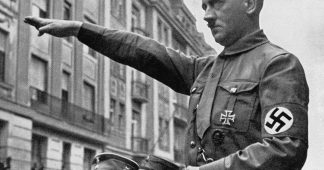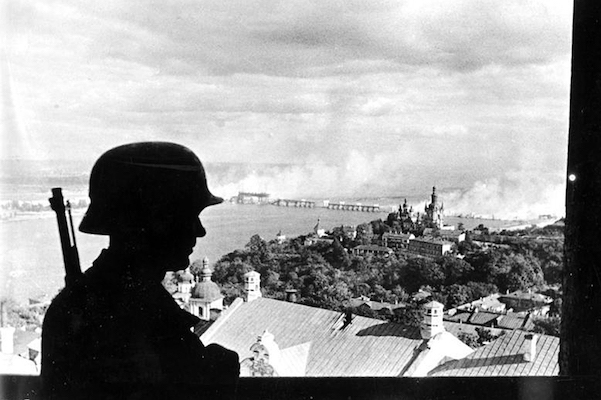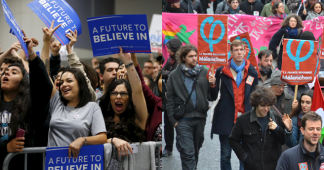It would be easy to dismiss the controversy over the latest Martin Amis offering as little more than a salon tiff among self-referential literati. His book, Koba the Dread, follows a well-trodden political path. An excoriation of Lenin, Stalin and communism in general (interlaced with long-simmering spats with his once communist father Kingsley and radical friend Christopher Hitchens), it is intended to be a savage indictment of the left for its supposed inability to acknowledge the crimes committed in its name. Strong on phrasemaking, the book is painfully short on sources or social and historical context. The temptation might be to see it as simply a sign that the one-time enfant terrible of the London literary scene was reliving his father’s descent into middle-aged blimpishness.
That would be a mistake. Amis’s book is in reality only the latest contribution to the rewriting of history that began in the dying days of the Soviet Union and has intensified since its collapse. It has become almost received wisdom to bracket Stalin and Hitler as twin monsters of the past century – Mao and Pol Pot are sometimes thrown in as an afterthought – and commonplace to equate communism and fascism as the two greatest evils of an unprecedentedly sanguinary era. In some versions, communism is even held to be the more vile and bloodier wickedness. The impact of this cold war victors’ version of the past has been to relativise the unique crimes of Nazism, bury those of colonialism and feed the idea that any attempt at radical social change will always lead to suffering, killing and failure.
This profoundly ideological account has long since turned into a sort of gruesome numbers game. The bizarre distortions it produces were on show last week during a television interview with Amis, when the BBC presenter Gavin Esler remarked in passing that Stalin was “responsible for at least three times as many deaths” as Hitler – a truly breathtaking throwaway line. Esler was presumably comparing Amis’s own figure of 20 million Stalin victims (borrowed from the cold war historian Robert Conquest) with the 6 million Jews murdered by Hitler in the Holocaust. But of course Hitler took a great many more lives than 6 million: over 11 million are estimated to have died in the Nazi camps alone and he might reasonably be held responsible for the vast majority of the 50 million killed in the second world war, including more than 20 million Soviet dead.
But in the distorted prism of the new history, they are somehow lost from the equation. At the same time, the number of victims of Stalin’s terror has been progressively inflated over recent years to the point where, in the wildest guesstimates, a third of the entire Soviet population is assumed to have been killed in the years leading up to the country’s victory over Nazi Germany. The numbers remain a focus of huge academic controversy, partly because most of them are famine deaths which can only be extrapolated from unreliable demographic data. But the fact is that the opening of formerly secret Soviet archives has led many historians – such as the Americans J Arch Getty and Robert Thurston – to scale down sharply earlier cold war estimates of executions and gulag populations under Stalin. The figures are still horrific. For example, 799,455 people were recorded as having been executed between 1921 and 1953, and the labour camp population reached 2.5 million (most convicted for non-political offences) at its peak after the war. But these are a very long way from the kind of numbers relied on by Amis and his mentors.
For all their insistence on moral equivalence, Amis and even Conquest say they nevertheless “feel” the Holocaust was worse than Soviet repression. But the differences aren’t just a matter of feelings. Despite the cruelties of the Stalin terror, there was no Soviet Treblinka, no extermination camps built to murder people in their millions. Nor did the Soviet Union launch the most bloody and destructive war in human history – in fact, it played the decisive role in the defeat of the German war machine (something that eluded its tsarist predecessors). Part of the Soviet tragedy was that that victory was probably only possible because the country had undergone a forced industrial revolution in little more than a decade, in the very process of which the greatest crimes were committed. The achievements and failures of Soviet history cannot in any case be reduced to the Stalin period, any more than the role of communists – from the anti-fascist resistance to the campaigns for colonial freedom – can be defined simply by their relationship to the USSR.
Perhaps most grotesque in this postmodern calculus of political repression is the moral blindness displayed towards the record of colonialism. For most of the last century, vast swathes of the planet remained under direct imperial European rule, enforced with the most brutal violence by states that liked to see themselves as democracies. But somehow that is not included as the third leg of 20th-century tyranny, along with Nazism and communism. There is a much-lauded Black Book of Communism, but no such comprehensive indictment of the colonial record.
Consider a few examples. Up to 10 million Congolese are estimated to have died as a result of Belgian forced labour and mass murder in the early 1900s. Up to a million Algerians are estimated to have died in the war for independence from France in the 1950s and 1960s. Throughout the 20th-century British empire, the authorities gassed, bombed and massacred indigenous populations from Sudan to Iraq, Sierra Leone to Palestine, India to Malaya. And while Martin Amis worries that few remember the names of Soviet labour camps, who now commemorates the name of the Andaman islands penal colony, where 80,000 Indian political prisoners were routinely tortured and experimented on by British army doctors, or the huge Hola internment camp in Kenya where prisoners were beaten to death in the 1950s?
If Lenin and Stalin are regarded as having killed those who died of hunger in the famines of the 1920s and 1930s, then Churchill is certainly responsible for the 4 million deaths in the avoidable Bengal famine of 1943 – and earlier British governments are even more guilty of the still larger famines in late 19th and early 20th-century India, which claimed as many as 30 million victims under a punitive free market regime. And of course, in the post-colonial era, millions have been killed by US and other western forces or their surro gates in wars, interventions and coups from Vietnam to central America, Indonesia to southern Africa.
There is no major 20th-century political tradition without blood on its hands. But the battle over history is never really about the past – it’s about the future. When Amis accuses the Bolsheviks of waging “war against human nature”, he is making the classic conservative objection to radical social change. Those who write colonial barbarity out of 20th-century history want to legitimise the new liberal imperialism, just as those who demonise past attempts to build an alternative to capitalist society are determined to prove that there is none. The problem for the left now is not so much that it has failed to face up to its own history, but that it has become paralysed by the burden of it.











